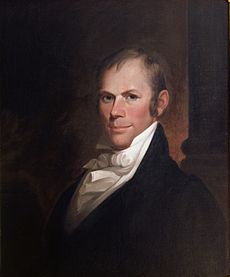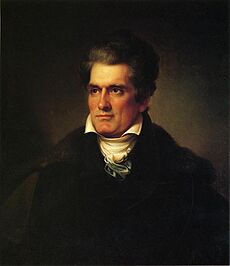War hawk facts for kids
In politics, a war hawk (or simply a hawk) is a person who supports going to war. They prefer to use military force to solve conflicts. This is different from a war dove, or dove. Doves believe in solving problems through talking and diplomacy.
Contents
Meaning and Origin
The terms "hawk" and "dove" come from the birds of the same name.
- Hawks are predators that hunt and attack other animals.
- Doves eat seeds and are often used as a symbol of peace.
Because of this, a politician who acts aggressively is called a hawk. A politician who wants peace is called a dove.
The War Hawks of 1812

The term "war hawk" became very famous in the United States just before the War of 1812.
Who Were They?
In 1811, a group of young politicians was elected to the United States Congress. They were mostly from the South and the West. They were angry at Great Britain for hurting American trade and sailors. They wanted the United States to declare war on Britain.
Historians call about 12 to 24 of these congressmen the "War Hawks." They were led by Henry Clay from Kentucky. Clay was the Speaker of the House. Another famous member was John C. Calhoun from South Carolina.
What Did They Do?

The War Hawks pushed President James Madison to take action. Although some people opposed the war, the War Hawks were successful. In June 1812, the United States declared war on Great Britain.
Henry Clay and John C. Calhoun became very important leaders in American history for many years after the war.
Modern Usage
People still use the word "hawk" in politics today. It describes someone who wants a strong military or aggressive policies.
Variations
There are different types of hawks mentioned in news and history:
- Chickenhawk: This is a slang term. It refers to a person who supports war but avoided joining the military themselves.
- Liberal Hawk: This describes a person who has liberal views on laws at home but supports military action in other countries.
- Deficit Hawk: This is not about war. It describes a politician who wants to reduce the government's budget debt.
See also

